8 Beauty Benefits Of Iron For Skin, Hair, & Nails
Better Living uses affiliate links. If you make a purchase through them, we may receive a small commission (for which we are deeply grateful) at no cost to you.
Iron is a big deal when it comes to energy production in the body. But this essential trace mineral is also important when it comes to the health of our hair, skin, and nails. Why? The reason lies within the structure of our red blood cells.
Our red blood cells have one main job: carrying oxygen from our lungs to the rest of our body where it’s used to transform the food we eat into cellular energy so our cells can continually grow and repair. (1)
The key to making this happen is a protein found in our red blood cells called hemoglobin. Hemoglobin is what makes our blood red, but also requires iron as part of its structure to be able to bind to oxygen and then move it through the body.
What’s fascinating is that each one of our red blood cells has approximately 270 million molecules of hemoglobin. And each one of those molecules requires iron. So when our iron levels are low, our body can’t make enough red blood cells to keep us healthy. Which means when our iron stores can’t keep up with the oxygen needs of our body, it can lead to symptoms like fatigue, dizziness, poor memory, low immunity and shortness of breath. But, that’s not all.
Keep reading to learn about the beauty benefits of iron for our skin, hair and nails and how one breakthrough, plant-based, iron supplement called Ferritin+ from Flora Health can keep you looking and feeling fantastic.
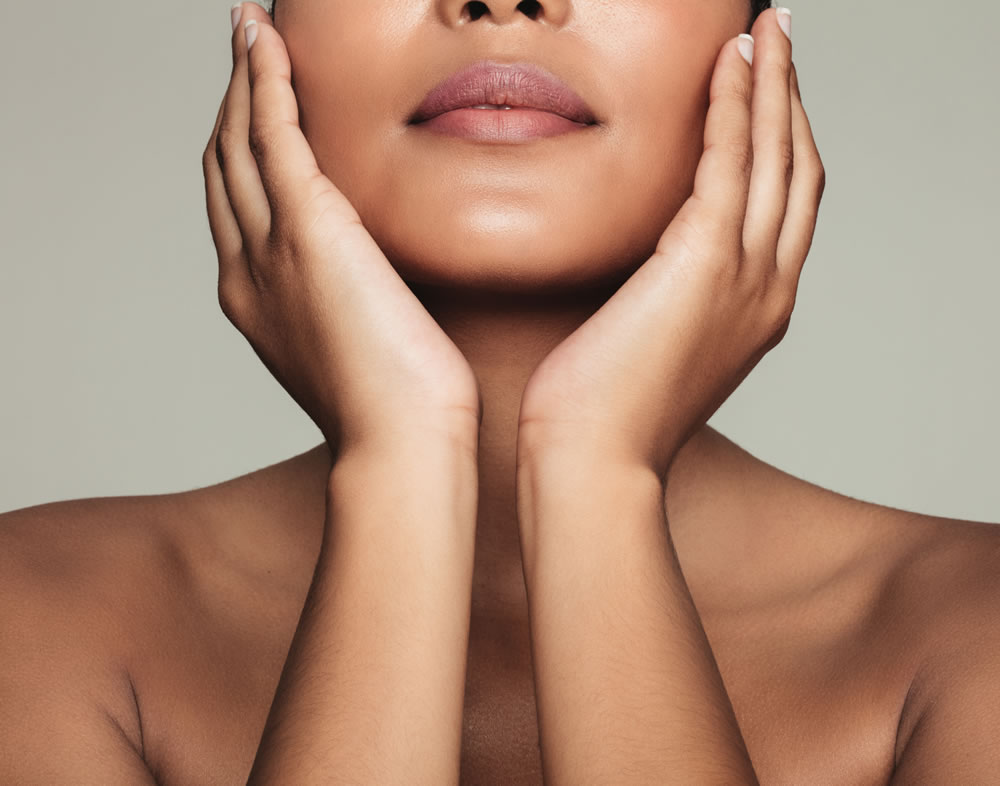
1. Iron Is Crucial For Building Collagen, A Protein Responsible For Gorgeous Skin And A Youthful Glow
If you’re looking to smooth out your skin and turn back the clock, collagen has been one of the most talked about compounds in the world of beauty for the last several years.
Iron happens to be a major nutrient required for the production of this important protein found in almost every tissue of the body. It’s also responsible for keeping our skin hydrated while giving it structure, elasticity, and a bouncy youthful glow. (2)
Once we reach around the age of 30, collagen synthesis in the body begins to slow, which is when we start to lose volume in our skin and fine lines and wrinkles can start to appear. When it comes to collagen, it’s important to avoid nutritional deficiencies like iron to help encourage your body to continue to produce the collagen, leaving your skin smooth, supple and wrinkle free.
2. Iron Is Important For Healthy Skin And Wound Healing
Skin rejuvenating treatments like microneedling and dermabrasion intentionally damage our skin, with the purpose of triggering the skin cells to heal back in a way that erases the signs of aging.
Iron happens to be an important mineral needed for this complex process.
Important for healing wounds, including scrapes, burns, cuts, incisions from surgery, iron helps carry oxygen to our skin cells where it aids in cell growth and the formation of new tissues while encouraging the repair of damaged injured skin. (3, 4)
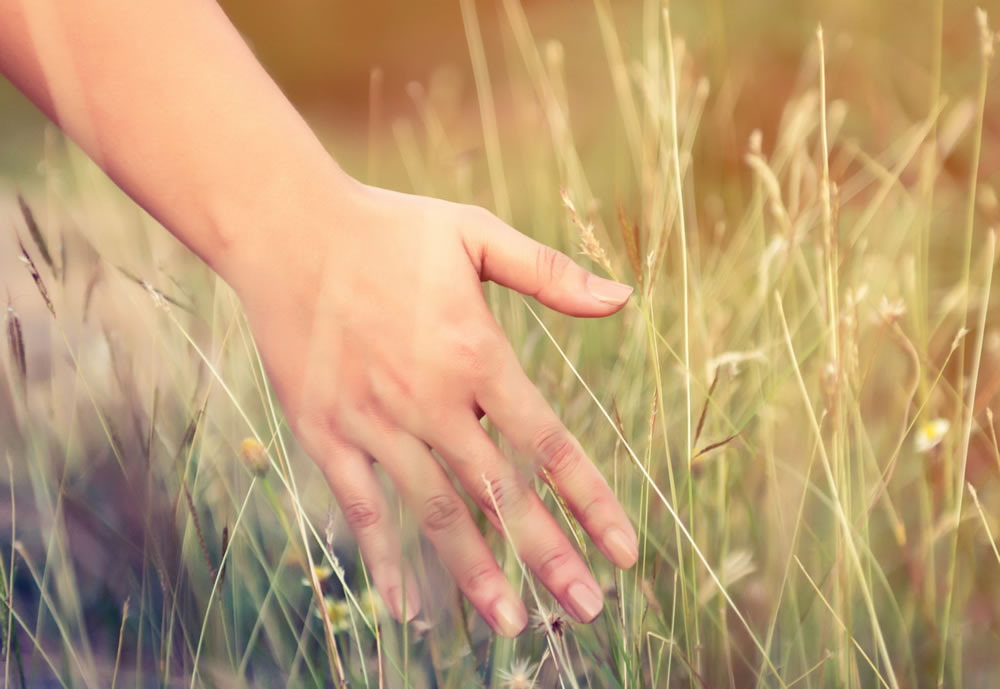
3. Can’t Grow Your Nails? Low Iron Can Cause Brittle Nails That Break Easily
When our iron stores are low, our body energy is low too. The structure of our nails can suffer too. Low iron commonly leads to brittle nails that easily break, peel or split. In severe cases, it can cause something called spoon nails that have a scooped shape similar to potato chips. (5) Not exactly the look most of us are after.
Getting more iron in your diet and taking an effective iron supplement like Ferritin+ from Flora can help encourage your nails to grow healthier and stronger than ever.
4. Iron Can Help Keep Your Complexion Looking Flush And Healthy
There’s a reason why blush is one of the most popular cosmetics: a bit of color on the cheeks makes us look more youthful, healthy, vibrant and attractive.
The truth is if you’re not absorbing enough iron or replacing it faster than you’re using it, it’s common for the complexion of your skin to become visibly pale due to a decrease in the number of red blood cells. (6)
Once you get your iron levels back up, you’ll notice a visible return of the flush in your cheeks.
5. Keep Your Iron Levels Healthy To Help Prevent Skin Issues Like Eczema and Psoriasis
Itchy skin is a common symptom of low iron levels and iron-deficiency. But recent research has found evidence that iron-deficiency can also trigger inflammatory skin conditions like eczema (atopic dermatitis) which can cause dry skin, blisters and rashes with scaly patches that leave the skin prone to infections. (7)
Low-iron levels have also been linked with psoriasis, another skin condition that causes skin cells to replicate ten times faster than normal and can cause a buildup of flakey, scaly patches of dead skin that may crack or bleed and often show up on our elbows, knees, scalp, ears and even nails. (8)
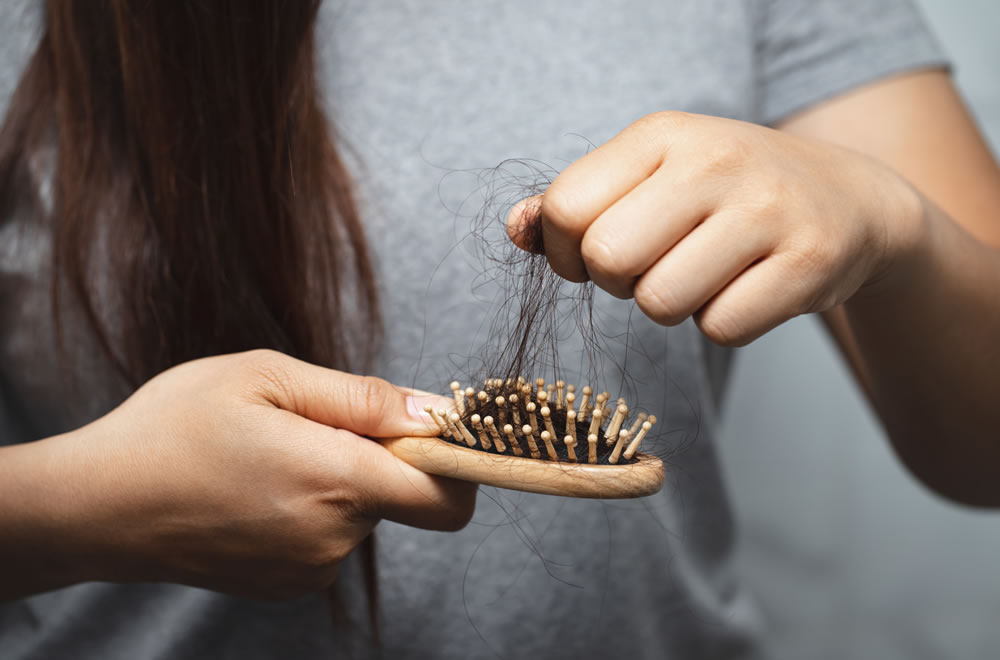
6. Noticing More Hair Loss Than Usual? Iron Is An Important Nutrient Needed For The Growth Of Strong, Gorgeous Hair
Oxygen and iron, carried by hemoglobin, are required for all our cells to produce energy to grow and stay healthy. This includes the cells responsible for the growth and repair of our hair. After decades of research, low-iron, although not believed to be a direct cause, has been linked with a variety of different types of hair loss including female pattern baldness and alopecia. (9)
It’s normal to lose about 50 to 100 hairs a day. But if you’re noticing more hair than usual or notice your hair is thinning, brittle and dry, low iron may be the culprit. The good news is that hair loss due to low iron is reversible once you restore your iron back to healthy levels.
7. Iron and Vitamin B12 Are Like Peas in a Pod When it Comes to Having Healthy Hair, Skin And Nails
Nutrients never work in our bodies independently. And when it comes to iron we also need plenty of vitamin B-12 to maintain healthy levels. And like iron, B12 is also important for glowing skin, healthy hair and strong nails.
Here’s how they work together: Vitamin B-12 activates an enzyme that allows the body to use folate (Vitamin B9), another vitamin required for the healthy production of red blood cells.
When vitamin B-12 levels are low, this can cause a delay of the amount of folate available, which means our body can’t make enough. And less red blood cells, means less iron to carry oxygen throughout the body. B12 and iron-deficiency symptoms are quite similar and both include fatigue, brittle nails and dull hair. Low levels of B12 have also been linked with skin hyperpigmentation.
8. Iron Can Help You Get Your Beauty Sleep Too
When someone mentions that you “look tired,” it’s usually not a complement. The truth is, if we’re not sleeping it’s usually written all over our face with a pale complexion, wrinkles and puffy red eyes with dark circles. Not getting enough quality sleep over time can also trigger stress, which can lead to hormone imbalances and skin breakouts.
Sleep is also a major part of the body’s repair process, facilitating the production of hormones that repair skin from the toxins of the day, as well as the production of collagen for plumper, smoother, more hydrated, skin. Blood flow is also increased to the skin and scalp during sleep, which carries nutrients like iron-bound oxygen to support the growth and repair of healthy skin, hair and nails.
While feeling tired and fatigued are common symptoms of low iron levels, studies have shown that it can not only interfere with your sleep but also put you at risk of more severe sleep disorders. (10)
Keeping your iron levels healthy is an important piece to the puzzle when it comes to getting your beauty sleep and looking your best.
Who Is At Risk For Low-Iron?
It’s estimated that over 10 million adults in the U.S. are iron deficient with menstruating, breastfeeding and pregnant women most at risk. (11) But men are at risk too, as is anyone over the age of 65.
Other risk factors for low iron include regularly doing intense exercise like HIIT (since iron can be lost through sweat) or have had blood loss due to injury, surgery or blood donation. Digestive issues like IBS or leaky gut that cause low level internal bleeding or absorption issues can also contribute to low iron levels.
According to the NIH recommendations, healthy women should get an average of 18 mg iron in their diet per day while men need only 8 mg. Pregnant women need upwards of 27 mg per day while menopausal women only need around 11.
If you suspect your iron levels are low, the only way to truly know is by having your doctor run a blood test.
What to Eat For Healthy Iron Levels
To make sure you’re always giving your body the iron it needs, it’s important to start with a healthy diet of iron-rich foods.
Some of the healthiest and iron rich foods include lean meats and seafood including oysters, clams, beef, liver, and mussels.
Iron rich plant-based food sources per cup include morel mushrooms, spinach, Swiss chard and asparagus. Legumes like white beans, chickpeas and black beans are also great sources of iron. As are fortified cereals, pumpkin seeds, quinoa and oats.
To improve iron absorption in the stomach, be sure to eat plenty of vitamin C rich fruits and veggies with your meals like lemons, oranges, strawberries and leafy greens.
Love your coffee or tea? Us too. But they do contain compounds like polyphenols, and tannins that are known to bind with plant-based sources of iron and block its absorption. (12) Try to drink these types of beverages about an hour before or after meals.
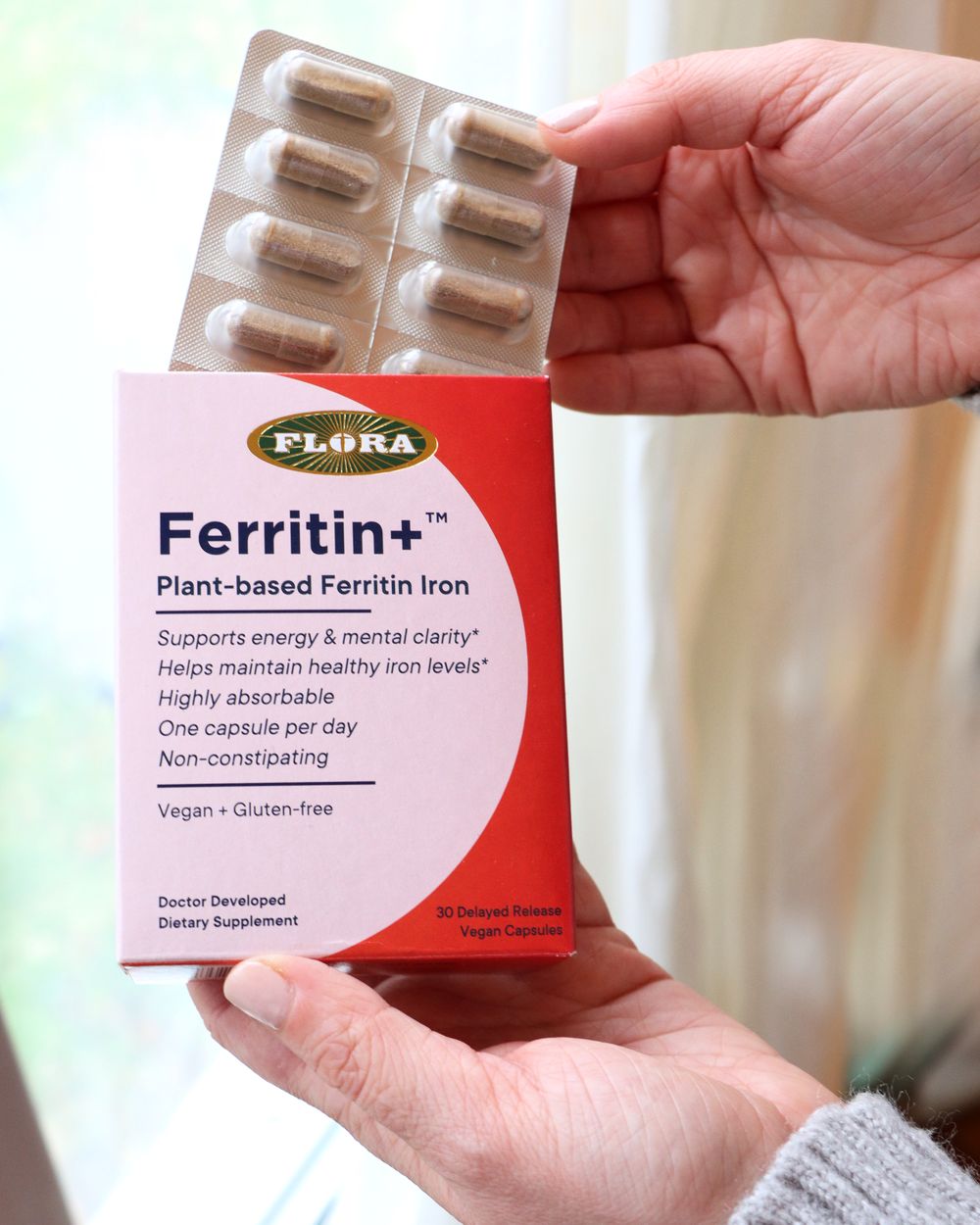
This Plant-Based Iron Supplement Is Super Effective Without The Usual Nasty Side Effects
Even if you’re eating right, an iron supplement can be an effective and often necessary way to get your iron levels up when they run low. Which means if you’re looking to improve your energy, while keeping nails, skin and hair on point, the right iron supplement can make all the difference.
But typical iron supplements that come in the form of “iron salts” with names like ferrous sulfate can often cause symptoms like stomach issues, and constipation. And they aren’t always easily absorbed by the body.
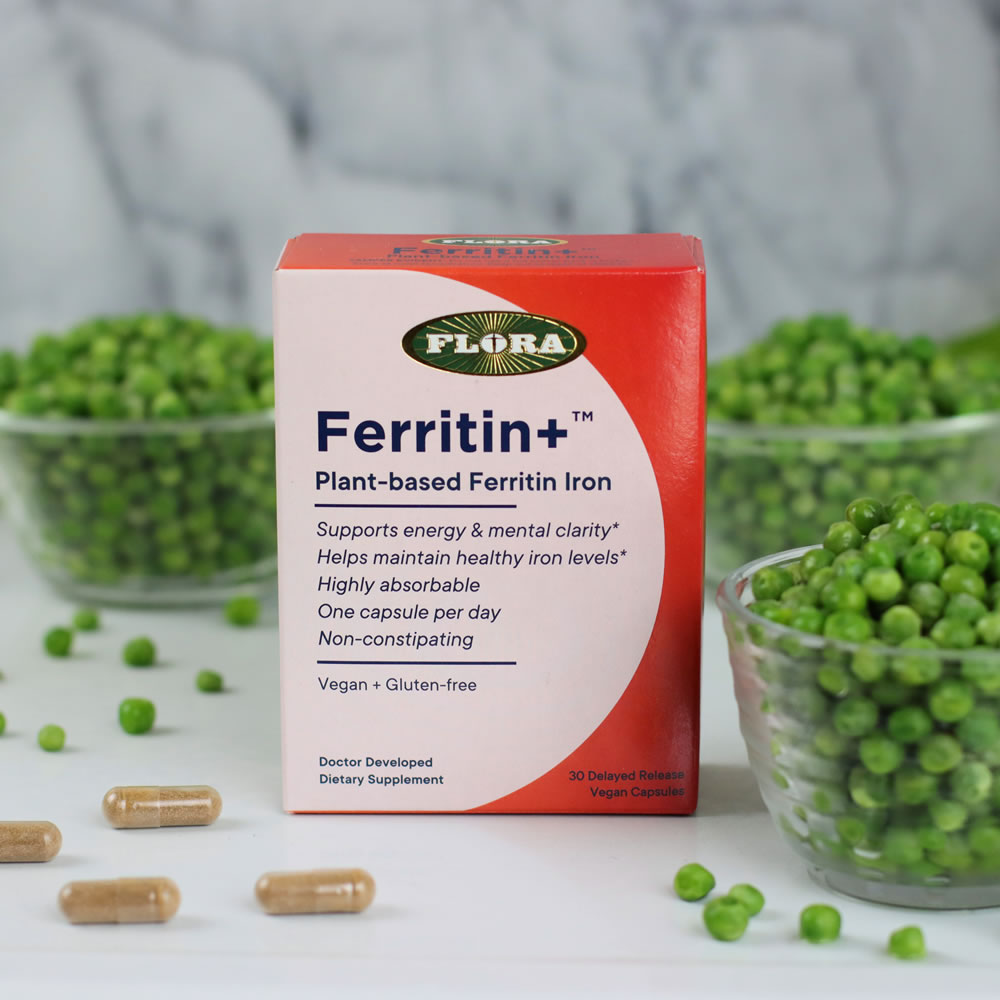
But a vegan-friendly, plant-based iron supplement called Ferritin+ from Flora Health is taking a different approach to iron supplementation without any of the unpleasant side effects. In fact, Ferritin+ is iron that’s extracted from organic peas in an easy to absorb protein form of iron called ferritin. (13)
To make sure you’re getting maximum effectiveness, Ferritin+ capsules are also enteric-coated to protect the protein from stomach acid so they can travel intact and slowly be released once inside the gut for full absorption. (14)
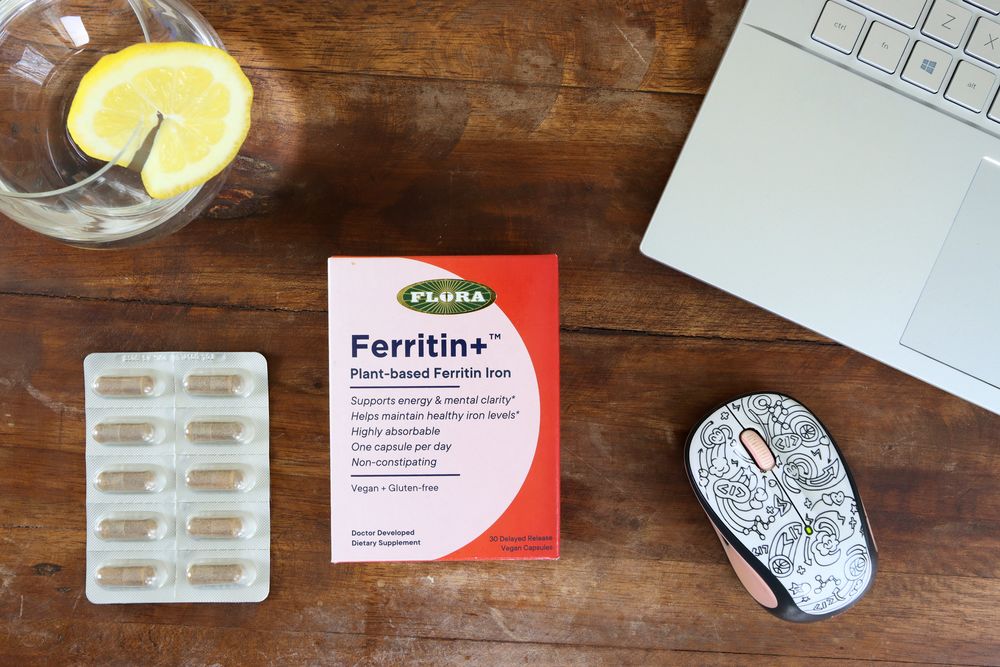
Taking 1 Ferritin+ capsule can provide you with 111% of your RDI of iron. It can also help to:
- Support the production of healthy red blood cells*
- Support energy & mental clarity*
- Support healthy iron levels for strong nails, healthy hair and healthy skin*
Ferritin+ is a safe and gentle, slow release form of iron that is:
- Non-irritating and non-constipating
- Gluten-Free
- Vegan and Plant-based
For a vegan-friendly, plant-based iron supplement that’s more effective and tummy friendly than other forms of iron, Ferritin+ by Flora Health can help balance and support your healthy iron levels while supporting your hair, skin, and nails through the power of plants.*
➡ Visit Flora Health to learn more and order Ferritin + now.
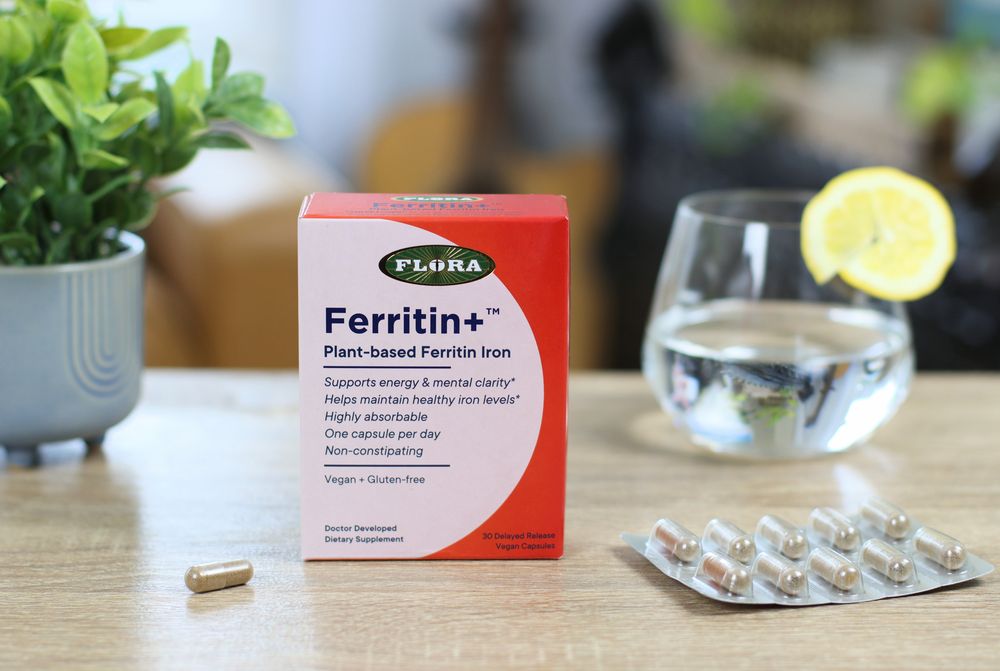
*These statements have not been evaluated by the Food and Drug Administration. This product is not intended to diagnose, treat, cure, or prevent any disease.
